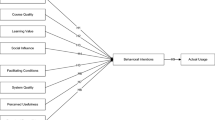Abstract
We present both design and a mixed method evaluation scheme of a semester-long course for scientific literature work. Focus of this contribution lies on the implementation for an e-learning environment with a clearly structured overview as key requirement, reflecting teaching concepts used, that is designed to reduce complexity of usage. Teaching concepts are derived from Self-Determination Theory and are assumed to provide learning conditions to support an optimal motivation profile by focusing on autonomy support, involvement, and structure. Demand-driven student-teacher communication is possible through hybrid communication structures. Approaches to flexibility are reflected by students’ own choice of research focus. Situated in 5th semester within a bachelor curriculum, Artificial Neural Networks are used as a thematical framework which easily can be adapted to other subjects. Teaching analysis poll is conducted to obtain timely feedback by students to identify helping and hindering factors for learning, followed by a questionnaire reflecting the acquisition of competences.
Access this chapter
Tax calculation will be finalised at checkout
Purchases are for personal use only
Similar content being viewed by others
Notes
- 1.
Due to a midterm in a parallel course, affected students wisely chose preparation time over feedback. For this semesters course presented in this contribution, we integrated evaluation in course content and expect a higher number of participants.
References
Moritz, R.E.: Der frühe Vogel - wissenschaftliches Schreiben im akademischen Curriculum. In: Schreibwissenschaft als Disziplin, in JoSch—Journal für Schreibwissenschaft, vol. 11. wbv Publikation (2020)
Prätsch, J., Rossig, W.E.: Erstellung und Bewertung wissenschaftlicher Arbeiten. In: Neues Handbuch Hochschullehre, DUZ Medienhaus (2006)
Dansereau, D., Carmichael, L., Hotson, B.: Research and teaching: building first-year science writing skills with an embedded writing instruction program. J. Coll. Sci. Teach. 049(03) (2020)
Lee, S.E., Woods, K.J., Tonissen, K. F.: Writing activities embedded in bioscience laboratory courses to change students’ attitudes and enhance their scientific writing (2011)
Grogan, K.E.: Writing science: what makes scientific writing hard and how to make it easier. Bull. Ecol. Soc. Am. 102(1) (2021)
Davila, Y., Leigh, A., Griffith, N., England, A.: An embedded, flipped and interactive approach to scientific writing. University of Technology Sydney. https://tinyurl.com/mvx3yp4j (2015). Accessed 5 Jul 2023
Gökçe, O., Prada, J., Nikolov, N.I., Gu, N., Hahnloser, R.H.R.: Embedding-based scientific literature discovery in a text editor application. In: Proceedings of the 58th Annual Meeting of the Association for Computational Linguistics: System Demonstrations (2020)
Zheng, S., Rosson, M.B., Shih, P.C., Carroll, J.M.: Understanding student motivation, behaviors and perceptions in MOOCs. In: Proceedings of the 18th ACM Conference on Computer Supported Cooperative Work & Social Computing, in CSCW’15 (2015)
Deci, E.L., Ryan, R.M.: Self-determination theory: A macrotheory of human motivation, development, and health. Can. Psychol. 49(3) (2008)
Badali, M., Hatami, J., Banihashem, S.K., Rahimi, E., Noroozi, O., Eslami, Z.: The role of motivation in MOOCs’ retention rates: a systematic literature review. Res. Pract. Technol. Enhanc. Learn. 17(1), 1–20 (2022)
Kursbeschreibung: Literature-Seminar. Course description (in German). https://eva2.inf.h-brs.de/studium/curriculum/2017/matrix/bi/326/de/ (2023). Accessed 26 Mai 2023
Fryer, L.K., Ginns, P., Howarth, M., Anderson, C., Ozono, S.: Individual differences and course attendance: Why do students skip class? Educ. Psychol. 38(4), 470–486 (2018)
McMillan, J.: Course change and attrition from higher education (2005)
Guay, F., Ratelle, C.F., Chanal, J.: Optimal learning in optimal contexts: the role of self-determination in education. Can. Psychol. 49(3), 233 (2008)
Legault, L.: Self-determination theory. In: Zeigler-Hill, V., Shackelford, T.K., Hrsg. Encyclopedia of Personality and Individual Differences. Springer International (2017)
ilias.de. https://www.ilias.de/. Accessed 27 May 2023
Li, K.C., Wong, B.Y.Y.: Revisiting the definitions and implementation of flexible learning. In: Li, K.C., Yuen, K.S., Wong, B.T.M., Hrsg. Innovations in Open and Flexible Education, Education Innovation Series. Springer, Singapore (2018)
Burdett, J.: Making groups work: university students’ perceptions. Int. Educ. J. 4(3), 177–191 (2003)
Collins, A., Brown, J.S., Newman, S.E.: Cognitive apprenticeship: teaching the craft of reading, writing, and mathematics. Technical Report No. 403 (1987)
Jick, T.D.: Mixing qualitative and quantitative methods: triangulation in action. Adm. Sci. Q. 24(4), 602 (1979)
Frank, A., Fröhlich, M., Lahm, S.: Zwischenauswertung im Semester: Lehrveranstaltungen gemeinsam verändern. Zeitschrift für Hochschulentwicklung (2011)
Penny, A.R., Coe, R.: Effectiveness of consultation on student ratings feedback: a meta-analysis. Rev. Educ. Res. 74(2), 215–253 (2004)
Hurney, C.A., Harris, N.L., Bates Prins, S.C., Kruck, S.E.: The impact of a learner-centered, mid-semester course evaluation on students. J. Fac. Dev. 28(3), 55–62 (2014)
Author information
Authors and Affiliations
Corresponding author
Editor information
Editors and Affiliations
Rights and permissions
Copyright information
© 2024 The Author(s), under exclusive license to Springer Nature Switzerland AG
About this paper
Cite this paper
Vieten, D., Reher, A., Gross, I. (2024). Work in Progress: Course Design and E-Learning-Environment for Scientific Competency Development for Bachelor’s Degree Students Within the Framework of Self-determination Theory. In: Auer, M.E., Cukierman, U.R., Vendrell Vidal, E., Tovar Caro, E. (eds) Towards a Hybrid, Flexible and Socially Engaged Higher Education. ICL 2023. Lecture Notes in Networks and Systems, vol 899. Springer, Cham. https://doi.org/10.1007/978-3-031-51979-6_1
Download citation
DOI: https://doi.org/10.1007/978-3-031-51979-6_1
Published:
Publisher Name: Springer, Cham
Print ISBN: 978-3-031-51978-9
Online ISBN: 978-3-031-51979-6
eBook Packages: Intelligent Technologies and RoboticsIntelligent Technologies and Robotics (R0)




